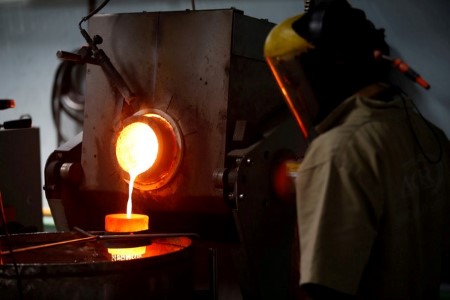




January Economic Update: Growth slows, prices rise
 DOWNLOAD
DOWNLOAD

Inflation Update: Up, up, and away?
 DOWNLOAD
DOWNLOAD

Quarterly Economic Growth Release: Growth takes on a slower pace
 DOWNLOAD
DOWNLOAD


Gold hovers near nine-month high, focus turns to US data

Jan 25 (Reuters) – Gold reversed course to edge up on Wednesday as the dollar weakened, and investors kept a close eye on a slew of upcoming US economic data that could influence the Federal Reserve monetary policy meeting next week.
Spot gold rose 0.2% to USD 1,940.49 per ounce by 1:40 p.m. ET (1840 GMT). US gold futures settled up 0.4% to USD 1,942.6.
Prices had fallen by up to 0.6% earlier in the session.
Some corrective price action and profit-taking from traders are the reasons for the slight pullback earlier today in gold, which “could be argued as being healthy for the uptrend to be extended,” said Jim Wyckoff, senior analyst at Kitco Metals.
Gold prices rose to a nine-month high on Tuesday as fears over a global recession and hopes around slower rate hikes from the US central bank boosted its allure.
The dollar was 0.3% lower on Wednesday, making gold more attractive to holders of foreign currencies.
The US Commerce Department is expected to unveil its initial advance fourth-quarter gross domestic product (GDP) estimates on Thursday, which could set the tone for the Fed’s Jan. 31-Feb. 1 policy meeting.
US weekly initial jobless claims, new home sales and durable goods orders are also on the radar for Thursday.
Traders see the policy rate peaking at 4.91% in June, even though Fed policymakers have repeatedly backed taking rates above the 5% level.
Lower interest rates tend to be beneficial for bullion as they decrease the opportunity cost of holding the non-yielding asset.
“Gold’s run was sparked by a change in sentiment in how quickly the Fed will pause its rate hikes,” along with the weakening in crypto exchange FTX and the US dollar, said Rupert Rowling, market Analyst at Kinesis Money in a note.
“Gold will need a fresh catalyst to push it higher than the elevated level it is already trading at.”
Elsewhere, spot silver rose 0.6% to USD 23.81 per ounce, platinum dropped 1.5% to USD 1,041.63 while palladium was down 2.7% to USD 1,696.50.
(Reporting by Seher Dareen in Bengaluru; Editing by Elaine Hardcastle and Krishna Chandra Eluri)
This article originally appeared on reuters.com





 By Reuters
By Reuters